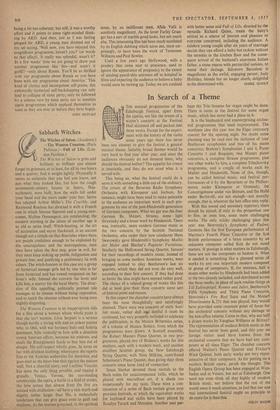Sabbath Witches
The Witches of Salem. (Academy.) —The Wanton Countess. (Paris Pullman.)—Full of Life. (Lon- don Pavilion.)
, The Witches of Salem is grim and brilliant; so brilliant you almost forget its grimness, or at least, for all its two hours and a quarter, find it weighs lightly. Physically it seems so authentic that you feel you know, not just what they looked like, but how the rough seventeenth-century houses in Salem, Mas- sachusetts, were built, how the walls felt under your hand and the stairs under your feet. Sartre has adapted Arthur Miller's The Crucible, and Raymond Rouleau has directed it with a French cast in which Simone Signoret and a young new- comer, M ylene Demongeot, are outstanding; the modern warning in the idiom of another age is as old as satire itself. Witch-hunting, or the art of accusation and secret blackmail, is an ancient though not a simple sin that flourishes where there are people credulous enough to be exploited by the unscrupulous; and the unscrupulous, once they have taken the first step, grow in evil, for they must keep stoking up public indignation and private fear, and justifying a preliminary lie with others. The witch-hunters in this case are a group of hysterical teenage girls led by one who is far from hysterical and has vowed vengeance on her lover's wife. Instead she convicts the lover and kills him, a martyr for the local liberty. The direc- tion of this appalling, politically pointed tale manages to be intense without being oppressive, and to touch the obscene without ever being even slightly disgusting.
The Wanton Countess is an inappropriate title for a film about a woman whose whole point is that she isn't wanton. Livia Serpieri is a serious though hardly a loving wife and an ardent patriot who, in 1866, with war between Italy and Austria imminent, falls violently in love with a dissolute young Austrian officer, becomes his mistress, and steals the Risorgimento funds to buy him out of danger. His self-respect wholly gone, he turns on her with drunken loathing; whereupon she reports him to the Austrian authorities for desertion, and goes mad as she hears him shot against the nearest wall. Not a cheerful story, and Luchino Visconti has done the only thing possible, and treated it grandly. Venice, Verona, the surrounding countryside, the opera, a battle in a field of stooks, the love scenes that almost from the first are tainted with disillusion—all have a rich depth and dignity rather larger than life, a melancholy tenderness that can give grace even to guilt and madness. As the woman possessed, in the spiritual sense, by an indifferent man, Atida Valli is sombrely magnificent. As the lover Farley Gran- ger has a sort of marble good looks, but not much else. This interesting film has been much mutilated by its English dubbing which turns out, most sur- prisingly, to have been the work of Tennessee Williams and Paul Bowles.
Until a few years ago Hollywood, with a prudery that came near to prurience, used to ignore the appearance of pregnancy to the extent of sending pencil-slim actresses off to hospital-in films and expecting the audience to believe a baby would soon be turning up. Today we are credited
with better sense and Full of Life, directed by the versatile Richard Quine, treats the baby's arrival as a source of interest and pleasure to everyone concerned, including the audience. A modern young couple after six years of marriage decide they can afford a baby but reckon without the termites in the kitchen floor and the conse- quent arrival of the husband's enormous Italian father, a stone mason with patriarchal notions, to mend their damage. Salvatore Baccaloni is magnificent as the awful, engaging parent; Judy Holliday, blonde but no longer dumb, delightful
































 Previous page
Previous page